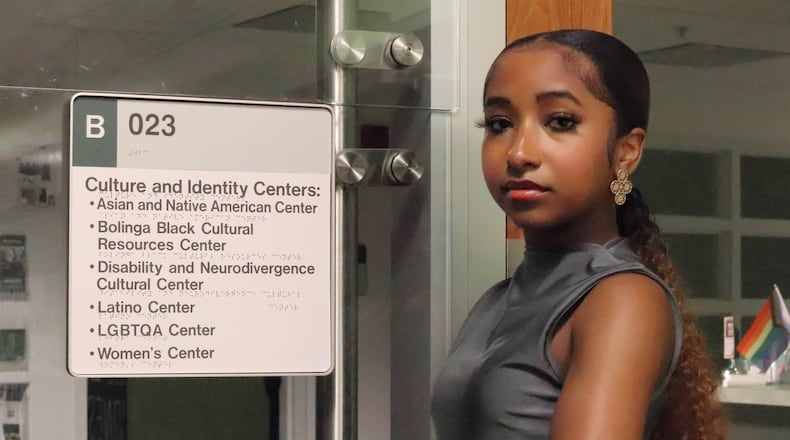“June 26, when I saw and knew and realized that it was going to be all effective June 27, I was crying,” Bush said. “I didn’t want to talk to anybody that day, the next day, and probably even that next day. I really didn’t want to do too much communicating or reaching out because I was so sad.”
WSU trustees recently announced the closure of the Asian and Native American Center, the Bolinga Black Cultural Resources Center, the Latino Center, the LGBTQA Center, and the Women’s Center. They say the move is in response to Senate Bill 1, which went into effect June 27 and bans diversity, equity and inclusion measures on Ohio higher education campuses.
As a member of three organizations herself, Bush said the news has left her stressed when thinking about the future. She recounts how places like the Bolinga Center have been around ever since her father went to Wright State and that they’re irreplaceable for students as spaces to network, find help and feel safe.
“We need (cultural and identity centers) because people need those,” Bush said. “Students need those. It’s not a want. It’s a need.”
The Bolinga Center celebrated its 50th anniversary in 2021. In an article in WSU’s alumni magazine marking the anniversary, 1973 graduate Carolyn Wright said the center helped Black students navigate a difficult environment.
“As we look to the future, there is a need for vigilance as it relates to higher education for Black students, and Bolinga needs to continue to play a significant role in seeing that need is fulfilled,” Wright said. “The Bolinga Center must play a leading role in defining and promoting the cultural as well as intellectual opportunity for young Black people.”
Bush added that not having the centers will be “very disheartening.”
“It’s going to cause students to either stay inside or to have social anxiety or to feel like they don’t know who they can talk to because they’re not able to find or see or run into anyone that looks like them or can really relate to them because these centers are gone,” Bush said.
“What’s the issue with us being able or wanting to gather and join each other and have conversations that are relatable to each of our experiences because we culturally can understand each other. Whether that’s via race, ethnicity, gender, or sexuality, what is the issue within that? Or is it not an issue and it just correlates and corresponds to prejudice, discrimination, and racism as a whole?”
S.B. 1 backer reacts
Backers of the bill say S.B. 1 was intended to combat discrimination in areas such as hiring and admissions in higher education.
State Rep. Tom Young, R-Washington Twp., was a backer of S.B. 1 and is a former Wright State trustee. He said Ohio colleges and universities are expected to still provide supports to students who need it, they just can’t fund discriminatory programs using state funds.
“I will absolutely guarantee you that everything that they’re doing at (the Bolinga Center) is already being done elsewhere as well, and every one of those students will be accommodated,” Young said.
“I would find it hard to believe the non-funding of that organization is going to close any effort or any opportunity for any student at Wright State University,” he said.
Young said he is working on legislation on enforcement of S.B. 1 that he hopes will clear up misunderstandings on adhering to the law.
Faculty members react
Megan Faragher, president of the Wright State faculty union and an English professor at the university’s Lake Campus, said Ohio universities have been acting as if Senate Bill 1 was law for a while, so this is the latest of many moves to comply with the law.
“Other faculty are concerned about how programs whose accreditation requirements might violate the law will get the paperwork to exempt their programs,” Faragher said.
She added that faculty are worried about the potential ramifications of the bill.
“Faculty teaching across arts, history, and social sciences have additional concerns about the vague language in the bill and have expressed concerns that they and their students will be more subject to censorship,” she said.



